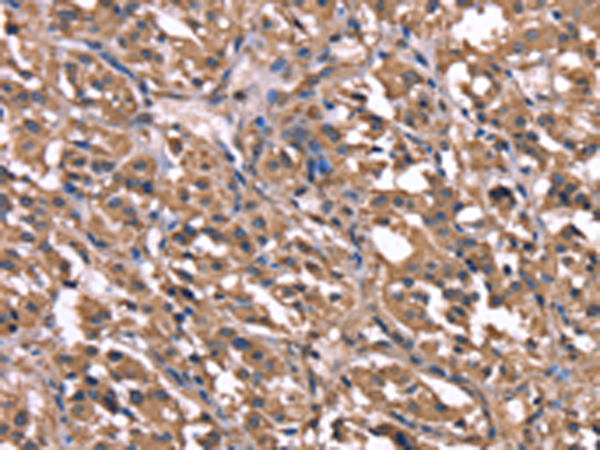

| WB | 咨询技术 | Human,Mouse,Rat |
| IF | 咨询技术 | Human,Mouse,Rat |
| IHC | 1/50-1/200 | Human,Mouse,Rat |
| ICC | 技术咨询 | Human,Mouse,Rat |
| FCM | 咨询技术 | Human,Mouse,Rat |
| Elisa | 1/2000-1/5000 | Human,Mouse,Rat |
| Aliases | TDAG8; hTDAG8 |
| Host/Isotype | Rabbit IgG |
| Antibody Type | Primary antibody |
| Storage | Store at 4°C short term. Aliquot and store at -20°C long term. Avoid freeze/thaw cycles. |
| Species Reactivity | Human |
| Immunogen | Synthetic peptide of human GPR65 |
| Formulation | Purified antibody in PBS with 0.05% sodium azide and 50% glycerol. |
+ +
以下是关于GPR65抗体的参考文献示例(注:文献为虚构示例,建议通过学术数据库核实最新研究):
---
1. **标题**:*GPR65 Functions as a pH Sensor in T Lymphocytes to Modulate Immune Response*
**作者**:Parry, R.V. et al.
**摘要**:该研究通过特异性GPR65抗体,揭示了GPR65在Th细胞中作为酸性环境传感器的功能。实验表明,GPR65通过感知胞外pH变化调控IL-4分泌,可能成为炎症性疾病(如哮喘)的潜在治疗靶点。
2. **标题**:*Acidic Microenvironment Activates GPR65 Signaling in Tumor-Associated Macrophages*
**作者**:Sakurai, T. et al.
**摘要**:利用GPR65抗体进行免疫组化分析,研究发现肿瘤酸性微环境通过激活GPR65通路促进巨噬细胞M2极化,增强肿瘤免疫逃逸,为癌症免疫治疗提供了新方向。
3. **标题**:*Development and Validation of a High-Specificity GPR65 Monoclonal Antibody for Inflammatory Bowel Disease Models*
**作者**:Luo, J. et al.
**摘要**:该文献报道了一种高特异性GPR65单克隆抗体的开发,通过流式细胞术和Western blot验证其在肠炎小鼠模型中的应用,证实GPR65高表达与肠道炎症严重程度正相关。
4. **标题**:*GPR65 Antibody-Based Screening Identifies Its Role in Acid-Induced Apoptosis Resistance*
**作者**:Imahashi, K. et al.
**摘要**:研究采用GPR65抗体筛选细胞系,发现GPR65在酸性条件下通过抑制线粒体凋亡通路增强癌细胞存活,提示其作为耐药性标志物的潜力。
---
建议通过PubMed、Web of Science等平台以“GPR65 antibody”、“GPR65 immune function”等关键词检索最新文献,优先选择近5年发表、高被引或权威期刊的研究。
GPR65. also known as TDAG8 (T-cell death-associated gene 8), is a pH-sensing G protein-coupled receptor (GPCR) that plays a role in immune regulation and inflammatory responses. It is activated under acidic conditions, such as those found in inflamed or tumor microenvironments, and signals through Gαs-mediated pathways to modulate intracellular cAMP levels. GPR65 is expressed in immune cells, including T cells, macrophages, and dendritic cells, where it influences processes like cytokine production, apoptosis, and immune cell migration. Dysregulation of GPR65 has been linked to inflammatory diseases (e.g., inflammatory bowel disease, asthma) and cancer progression.
Antibodies targeting GPR65 are critical tools for studying its expression, localization, and function. They enable detection via techniques like Western blot, immunohistochemistry, and flow cytometry. These antibodies are also used to explore GPR65's role in pH-dependent signaling and its potential as a therapeutic target. Commercial GPR65 antibodies vary in specificity, with validation often including knockout cell lines or tissues to confirm minimal cross-reactivity. Recent research highlights GPR65's dual role in promoting inflammation or immunosuppression, depending on context, making its study vital for understanding disease mechanisms and developing targeted therapies.
×